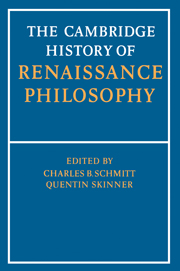Book contents
- Frontmatter
- Introduction
- PART 1 THE INTELLECTUAL CONTEXT
- PART 2 PHILOSOPHY AND ITS PARTS
- 6 Logic and language: Traditional logic
- 7 Logic and language: Humanistic logic
- 8 Natural philosophy: Traditional natural philosophy
- 9 Natural philosophy: The new Philosophy of nature
- 10 Natural philosophy: Astrology and magic
- 11 Moral philosophy
- 12 Political philosophy
- 13 Psychology: The concept of psychology
- 14 Psychology: The organic soul
- 15 Psychology: The intellective soul
- 16 Metaphysics
- 17 Problems of knowledge and action: Fate, fortune, providence and human freedom
- 18 Problems of knowledge and action: Theories of knowledge
- 19 Problems of knowledge and action: Epistemology of the sciences
- 20 Philosophy and humanistic disciplines: Rhetoric and poetics
- 21 Philosophy and humanistic disciplines: The theory of history
- PART 3 SUPPLEMENTARY MATERIAL
- Biobibliographies
- Bibliography
- Index nominun
- Index rerum
- References
10 - Natural philosophy: Astrology and magic
from PART 2 - PHILOSOPHY AND ITS PARTS
Published online by Cambridge University Press: 28 March 2008
- Frontmatter
- Introduction
- PART 1 THE INTELLECTUAL CONTEXT
- PART 2 PHILOSOPHY AND ITS PARTS
- 6 Logic and language: Traditional logic
- 7 Logic and language: Humanistic logic
- 8 Natural philosophy: Traditional natural philosophy
- 9 Natural philosophy: The new Philosophy of nature
- 10 Natural philosophy: Astrology and magic
- 11 Moral philosophy
- 12 Political philosophy
- 13 Psychology: The concept of psychology
- 14 Psychology: The organic soul
- 15 Psychology: The intellective soul
- 16 Metaphysics
- 17 Problems of knowledge and action: Fate, fortune, providence and human freedom
- 18 Problems of knowledge and action: Theories of knowledge
- 19 Problems of knowledge and action: Epistemology of the sciences
- 20 Philosophy and humanistic disciplines: Rhetoric and poetics
- 21 Philosophy and humanistic disciplines: The theory of history
- PART 3 SUPPLEMENTARY MATERIAL
- Biobibliographies
- Bibliography
- Index nominun
- Index rerum
- References
Summary
A SCEPTIC'S DEFINITION OF MAGIC
When Henricus Cornelius Agrippa published an enlarged edition of his De occulta philosophia in Cologne in 1533, seven years after he had written his invective De incertitudine et vanitate scientiarum atque artium (1526), he appended to it a Censura sive retractio in which he reprinted the chapters on magic from De incertitudine. Since in these chapters Agrippa's ardour for occult wisdom had somewhat abated, we may take their definition of natural magic to be the tempered judgement of a man who was, in any event, sincere in his Christian piety and skilled as a vulgariser of other people's ideas. ‘That magic is natural’, he explained, ‘which, having observed the forces of all things natural and celestial and having examined by painstaking investigation the sympathy among those things, brings into the open powers hidden and stored away in nature; thus, magic links lower things (as if they were magical enticements) to the gifts of higher things… so that astonishing miracles thereby occur, not so much by art as by nature to which – as nature works these wonders – this art of magic offers herself as handmaid.’
Agrippa recognised that magic was an art, a practical technique, but he also insisted on a theoretical content in magic, an analytic basis in the study of nature. Learned men had called magic ‘the highest point of natural philosophy’ because they saw in it speculative as well as pragmatic responses to the cosmos. The obverse of this learned natural magic, was sinful demonic magic. Warning that ‘natural magic has sometimes relapsed into sorcery and theurgy (most often through strategems of evil demons)’, Agrippa raised the spectre of demonology that haunted the Renaissance revival of ancient magic as it animated the concurrent witchcraft craze.
- Type
- Chapter
- Information
- The Cambridge History of Renaissance Philosophy , pp. 264 - 300Publisher: Cambridge University PressPrint publication year: 1988
References
- 12
- Cited by

